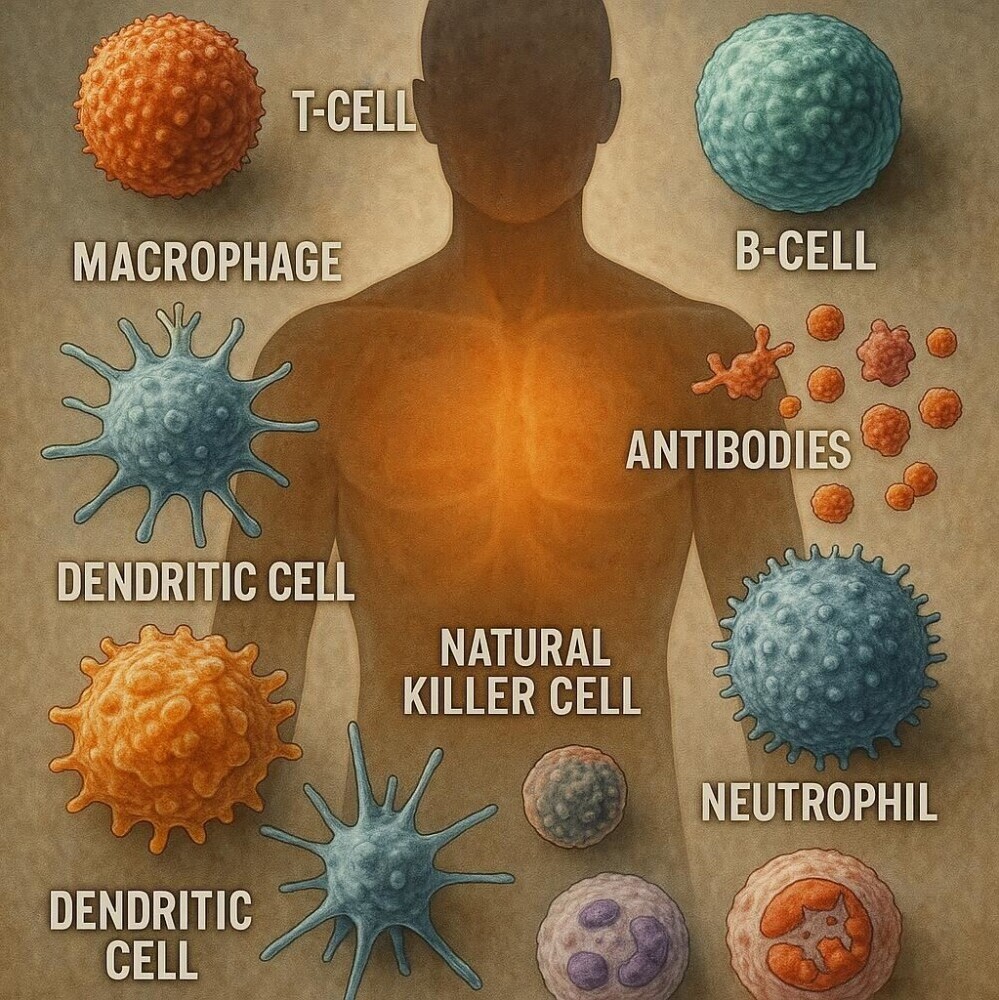Aging can throw the immune system many new challenges, making it not exactly what it used to be. As we get older, our immune response tends to get slower, and it’s not managing invaders like it did in our younger days. This change means higher susceptibility to infections, longer recovery times, and potentially more severe illnesses.
There are common culprits behind this weakened defense system in older adults. It’s no mystery that underlying health conditions play a role. Conditions like diabetes, chronic kidney disease, and heart disease can further challenge the immune system. Plus, certain medications might suppress or weaken immunity.
In addition living in today’s fast-paced world where stress, lack of sleep, and environmental toxins are part of daily life we do need to keep our immune system strong and this is more important than ever. For older adults in particular, the immune system becomes less responsive with age, making proactive immune support vital to long-term health and quality of life.
Recognizing the signs of a weakened immune system early on can make a huge difference. Consistent fatigue, frequent colds, or other infections can be an early wake-up call that the immune system might need some extra love and attention. It’s crucial to tune into these signals and work with healthcare providers to catch any issues before they turn serious.
The good news? While aging is inevitable, the decline in immune strength doesn’t have to be. By understanding how the immune system works, identifying the common causes of weakened immunity, and adopting lifestyle habits that nourish resilience, you can actively support your immune defenses.

This article answers common questions such as:
How can an older person boost their immune system?
What’s the number one thing to strengthen immunity?
What causes low immunity in the elderly?
And can you actually reboot your immune system to slow aging?
Let’s explore evidence-based ways to stay strong, healthy, and resilient at any age.
Aging and the Immune System
The immune system is a complex network of cells and processes designed to defend the body against harmful invaders.

It has two main branches:
Innate immunity, the first line of defense, acts quickly but non-specifically.
Adaptive immunity, which learns from past exposures, builds memory cells that fight infections more effectively over time.
As we age, these systems don’t work as efficiently. Scientists call this decline immunosenescence. Older adults produce fewer new immune cells, and chronic low-grade inflammation—sometimes called inflammaging—makes the body slower to respond. The result is greater vulnerability to infections, reduced vaccine effectiveness, and longer recovery times.
What causes a low immune system in the elderly? Common culprits include:
- Underlying conditions such as diabetes, kidney disease, and heart disease.
- Side effects of certain medications that suppress immune activity.
- Poor nutrition and vitamin deficiencies.
- Chronic stress and poor-quality sleep.
- Sedentary lifestyles with little movement.
Recognizing early warning signs—like frequent infections, slow wound healing, or ongoing fatigue—can help older adults take action sooner. By tuning in to these signals and working with healthcare providers, immunity can be better supported.
Diet and Nutrition: Fueling Your Immunity
The food you put on your plate has a big-time impact on fortifying that immune system of yours. Think of your diet as the fuel for your immunity’s engine. Load it up with the good stuff, and your body can have the tools it needs to defend against infections and diseases more effectively.

Key nutrients include:
Vitamin C: Supports white blood cell activity and acts as a powerful antioxidant.
Vitamin D: Regulates immune function and lowers risk of respiratory infections.
Zinc: Speeds wound healing and strengthens immune defenses.
These are superheroes in the world of immune defence.
Also consider Superfoods. These aren’t just buzzwords and they really are packed with nutrients that can power up your immunity. Consider adding berries, leafy greens, and garlic into your meals. These foods come loaded with antioxidants and other compounds that can enhance your body’s ability to fight off invaders. They will contribute to your overall health and help keep that immune system strong.
On the flip side, it’s important to steer clear of foods and habits that might drag down your defenses. Processed foods, excessive sugar, and junk food can take a toll, messing with your body’s ability to respond to threats. It’s also smart to cut back on high intake of alcohol and caffeine as they may negatively impact immune function.
Remember, building immunity through diet is not about drastic changes but rather creating balanced, nutrient-rich meals that keep you feeling your best. Pair these healthy eating habits with other lifestyle adjustments to support your immune system fully. It’s all about giving your body what it genuinely craves to stay resilient.
Exercise: The Movement towards Immunity
Keeping active is more than just getting your heart rate up, it’s a solid partner for boosting your immune system too. Physical activity can improve your circulation, allowing immune cells to move through your body efficiently doing their job of spotting trouble.
The trick is finding an exercise routine that caters to you. This isn’t about tough, high-intensity workouts for everyone. Light to moderate physical activities like walking, tai chi, and swimming can be golden, especially for older folks. These can make your heart happy, boost your immune response, and even lighten up your mood.

Consistency is key. Aiming for at least 150 minutes of moderate exercise spread across the week can yield improvements in both physical and immune health. Regular movement helps reduce inflammation, and it might keep those cold and flu bugs at bay, giving you fewer sick days.
Strength training, even with light weights, can also strengthen bones and muscles while supporting your immune system. These activities can improve everything from balance to immune response, playing a role in maintaining your independence.
Shouldn’t your exercise routine be all about pushing limits? Not exactly. It’s about what’s beneficial and sustainable. Listen to your body—rest when needed and stay hydrated to keep your energy and immune system firing on all cylinders.
Sleep and Stress: The Silent Influencers
Getting enough rest and managing stress aren’t just luxuries; they’re vital parts of the immune support puzzle. A good night’s sleep is when your body gets the downtime it needs to repair and regenerate, giving your immune system a chance to ramp up and set its defenses.
Deep sleep stages are especially important. That’s when the body releases proteins known as cytokines, some of which have a hand in enhancing the immune response. Lack of sleep can slow down this production, leaving your defenses compromised. Ultimately, aiming for 7 to 9 hours of quality sleep per night should be the goal.
Stress is sneaky. It might start small but chronic stress can lead to higher levels of cortisol, which could suppress the immune system over time. Finding ways to manage stress is key to keeping your immunity sharp. Mindfulness practices like meditation or yoga can help alleviate stress, deflating its impact on your overall well-being.
Combining good sleep with effective stress management can be a powerful duo. Think of it as the yin and yang of immune health, keeping you balanced and resilient against illnesses. Making these small, consistent changes in your routine can pay off big when it comes to maintaining a strong immune system. It’s about creating a lifestyle that supports you from the inside out.
Lifestyle Choices: Building Immune Resilience
What you choose to do in your day-to-day life can either power up or slow down your immune system. Making smart lifestyle choices isn’t just about feeling good right now and it plays a crucial role in building a strong foundation for better health.
First off, staying away from smoking and limiting alcohol intake has real benefits for your immune system. Cigarette smoke can damage the immune system’s ability to function normally, while excessive alcohol consumption can weaken the body’s defence mechanisms.
Keeping yourself hydrated is another easy yet impactful way to support immunity. Water helps in flushing out toxins and keeps your cells functioning at their best. Try to keep a water bottle handy and sip throughout the day.
Environmental factors also weigh in on your immune resilience. Exposure to pollutants and toxins, whether through air or through everyday products, can be detrimental.

Choosing natural, non-toxic products and ensuring good air quality in your living space can help minimize these exposures.
Incorporating small habits like regular handwashing and maintaining good hygiene can further contribute to preventing diseases. You’re not only protecting yourself but also those around you, making it a community effort.
Ultimately, adopting these healthy lifestyle choices isn’t about perfection; it’s about making gradual shifts that together give your immune system a fighting chance to stay strong and keep you on top of your game.
The Role of Supplements and Medications in Immune Health
Sometimes, diet and lifestyle changes alone might not be enough, especially for seniors. That’s where supplements can come into play, offering a little extra support for the immune system when needed.

Popular immune-boosting supplements include the following:
Vitamin D: Especially important for older adults who spend less time outdoors.
Vitamin C: Supports immune cell function and acts as an antioxidant.
Zinc: Helps fight infections and aids recovery.
Probiotics: Balance gut bacteria, which play a central role in immunity.
Herbal options like elderberry, echinacea, and astragalus have also shown promise in boosting defenses during cold and flu season.
That said, supplements should complement—not replace—a healthy lifestyle. Always consult a healthcare professional to ensure they don’t interact with medications or existing health conditions.
In some cases, prescribed medications may be essential for managing conditions that impact immunity. The key is working closely with healthcare providers to create a safe, tailored plan.
Rebooting the Immune System to Slow Aging
Can you actually reboot your immune system to slow aging? While there’s no magic button, research suggests that certain lifestyle resets can rejuvenate immune cells and reduce inflammation associated with aging.
Strategies include:
Intermittent fasting: Encourages the body to recycle old immune cells and generate new ones.
Gut repair: Probiotics, fiber, and fermented foods restore gut health, which is closely tied to immune resilience.
Anti-inflammatory nutrients: Omega-3s, curcumin, and resveratrol help reduce chronic inflammation and support healthy aging.
Stress reset: Practices like tai chi, meditation, and nature walks lower cortisol and refresh immune function.
Think of this as giving your immune system a reset button. It won’t stop the clock, but it can slow down its ticking—helping you stay strong, resilient, and vibrant as you age.
Conclusion
Your immune system changes with age, but you have the power to support it. By prioritizing nutrient-rich foods, regular movement, quality sleep, stress management, and wise supplementation, you can strengthen your defenses and improve overall well-being.

What’s the number one way to boost your immune system? It isn’t a single pill or superfood—it’s the consistent practice of healthy, balanced habits.
At Forever Young Supplements, we believe in empowering you to take control of your health naturally. Explore our Immune Support information and articles to find supplements designed to complement your lifestyle and keep your defenses strong for today and for years to come.
